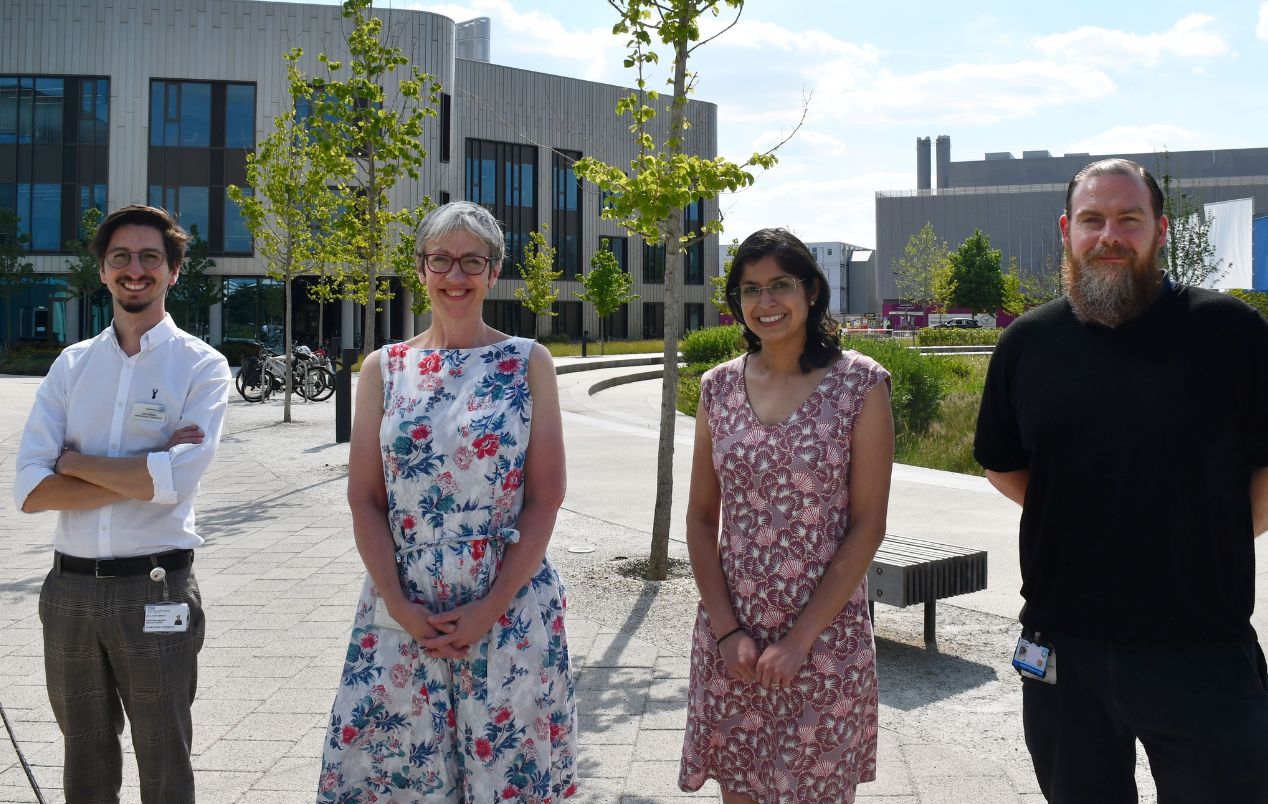Royal Papworth Hospital NHS Foundation Trust’s antimicrobial stewardship (AMS) team has received regional recognition for its excellence in achieving two key targets for antibiotic usage.
The two targets were ‘prompt and appropriate switching of antimicrobials from intravenous to oral’ and ‘a 10% reduction in the use of watch/reserve antibiotics’.
These targets are set by the Department of Health and Social Care and NHS England’s commissioning for quality and innovation (CQUIN) framework. They are designed to support improvements in the quality of services.
This means that patients at our hospital are benefitting from safer care through best practice in antibiotic usage.

The antimicrobial stewardship (AMS) team at Royal Papworth Hospital NHS Foundation Trust: (from left to right) Cristiano Serra, Antimicrobial Pharmacist; Netta Tyler, Highly Specialised Pharmacist; Dr Sumita Pai, Consultant Microbiologist; Simon Day, Principal Pharmacy Technician.
Prompt and appropriate switching of antimicrobials from intravenous-to-oral
Switching promptly from intravenous (IV) to oral antibiotics, when appropriate, is associated with improved patient outcomes.
This is because there is a decreased risk of infections associated with the IV line and there is also a reduced risk of medication errors such as dilution and dosage calculations.
Oral antibiotics also often help with earlier discharge, further reducing the risk of infections from prolonged stays in hospital.
Royal Papworth’s AMS team met their target of ensuring that 80% of intravenous antimicrobials prescriptions are appropriate.
A 10% reduction in the use of watch/reserve antibiotics, compared to a pre COVID-19 baseline
Antimicrobial resistance (AMR) is a significant threat to global health, contributing to millions of deaths worldwide each year.
Inappropriate use and overuse of antibiotics are driving an increase in resistance, limiting the effectiveness of these critical medicines.
The ‘watch’ group contains broad-spectrum antibiotics with a higher potential of developing resistance; the ‘reserve’ group contains last-resort antibiotics used for multidrug-resistant infections.
Our hospital was one of two in the eastern region to have achieved the 10% target, with a total decrease of 21%.

Dr Sumita Pai, Consultant Microbiologist at Royal Papworth Hospital
In a letter from Dr Fiona Head, Chief Medical Officer at Cambridgeshire and Peterborough Integrated Care System, Royal Papworth was praised for its ‘excellent work’ in achieving these antibiotic prescribing targets.
Dr Sumita Pai, Consultant Microbiologist, said: “It’s really important to reduce our use of both ‘watch’ and ‘reserve’ categories of antibiotics. Over-using and inappropriately using these drugs will only accelerate their ability to become resistant, meaning clinicians have fewer options available to treat patients in the future.
“We were able to achieve this reduction in part because of appropriate and timely switching of antimicrobials from intravenous to oral.
“I want to thank the whole AMS team here at Royal Papworth Hospital, which includes pharmacists and microbiologists, and all our other colleagues particularly on inpatient wards who support our work.”
